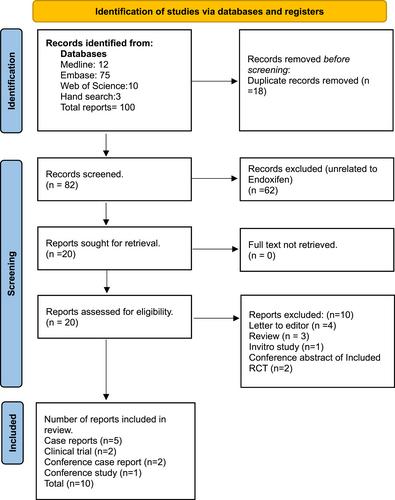Endoxifen, a protein kinase C inhibitor and selective estrogen receptor modulator, primarily used in breast cancer treatment, has recently emerged as a potential therapeutic option for managing manic episodes associated with bipolar disorder (BD). This review aims to assess the existing evidence base for endoxifen in BD treatment and evaluate the strengths and limitations of current research findings.
A systematic search was conducted on Medline, Embase, and Web of Science databases. We included studies published in English that used endoxifen in BD, alongside any relevant studies identified through manual searching and conference papers with full-text availability. Information pertaining to dose, duration, clinical effects, and safety profiles was extracted from the included studies. The Cochrane Risk of Bias 2 tool was used to assess the risk of bias in clinical trials.
The final review included seven case reports (including two conference presentations), two clinical trials, and one prospective study. Most studies administered endoxifen 8 mg and reported an improvement in manic symptoms. Several case reports included patients with comorbid substance use, and most patients received mood stabilizers concurrently. Few reports lacked any structured outcome measures. The clinical trials used divalproex 1000 mg as an active comparator, which was deemed sub-therapeutic. Despite being multicentric, the first trial lacked data on center-wise recruitment, and certain methodological concerns were observed across the included trials. There were no serious adverse effects noted, except for a significant elevation in lipid profile within a 3-week period. Limited data were available regarding endoxifen efficacy and safety in mixed episodes, depressive episodes, and maintenance treatment.
There is a paucity of research on the efficacy and safety of endoxifen in BD. While existing evidence suggests short-term efficacy in manic episodes, significant limitations were identified in most of the included studies. Further research is imperative to establish the efficacy and safety of endoxifen in BD before considering its recommendation as a viable treatment option.


